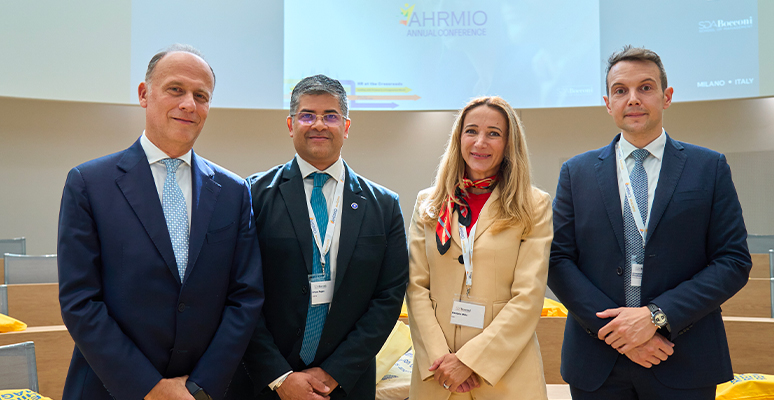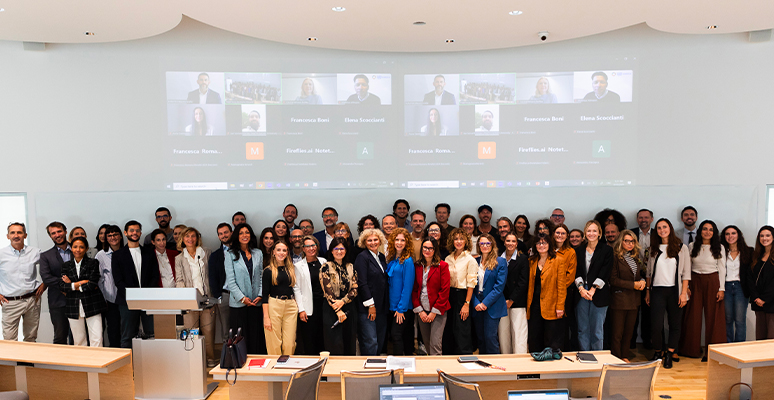
- Start Date
- Duration
- Format
- Language
- 7 Nov 2025
- 1 day
- Class
- English
The Monitor for Circular Fashion (M4CF) SDA Bocconi presented the 2024/2025 Report during the event Navigating Change: ESG Roadmaps to Circular Fashion at the Ferrero Auditorium on SDA Bocconi’s Milan campus. The event saw the participation of industry experts and representatives from the leading companies of the Monitor.
Francesca Romana Rinaldi, Director of the Monitor for Circular Fashion, illustrated the report's findings, which analyze the maturity level of companies regarding ecodesign, biodiversity, social impact, and governance in light of the new European regulations. The 28 companies of the M4CF, with 123,000 employees and a turnover of €34 billion in 2023, assessed their compliance with regulations such as Ecodesign, EUDR, Digital Product Passport, Green Claims, and the Due Diligence Directive.
The annual event brought together industry experts, partner companies of the M4CF, policymakers, institutional representatives, and numerous key players across the fashion supply chain, from upstream to downstream.
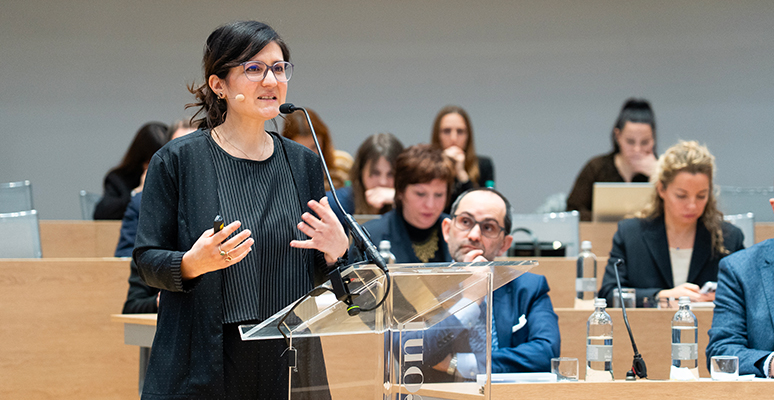
During the event, in addition to the presentation of the annual report by the Research Observatory, the M4CF pledge was introduced to institutional players such as the European Commission and UNECE. This pledge represents a formal commitment by partner companies to pursue goals related to circularity, sustainability, traceability, and transparency.
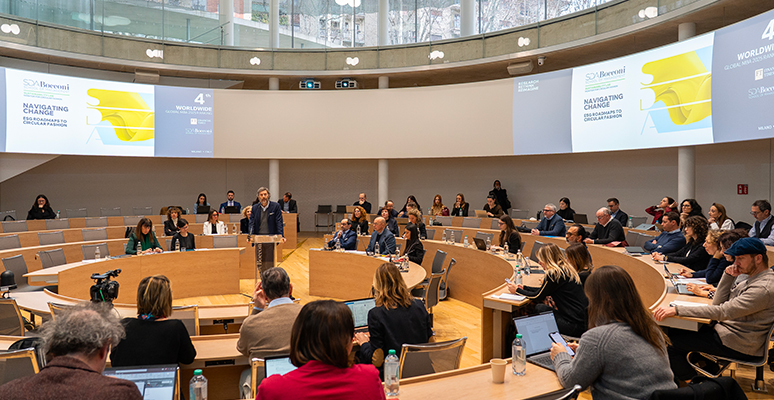
The results of the survey conducted among the M4CF partner companies on the maturity level of ecodesign reveal that most businesses are actively engaged in pilot projects for the implementation of ecodesign principles. These projects include the measurement of specific KPIs and a holistic approach that considers the entire product lifecycle. The most advanced companies ("monitored") at present are those that have begun integrating ecodesign principles within their business processes. To reach the highest level ("optimized"), they still need to activate continuous improvement processes in the development of circular products with performance indicators and the involvement of consumers (e.g., through repair practices, take-back programs...) and other stakeholders (e.g., EPR consortia, recyclers, etc.). With the arrival of the sector-specific delegated act completing the Ecodesign for Sustainable Products Regulation (ESPR), companies will be pushed to move in this direction.
The analysis of research results shows that the implementation of ecodesign strategies, which require initial investments, higher operational costs, and greater complexity, is associated with higher expected benefits. These findings apply to both supply chain actors and service providers. Furthermore, considering the assessment of complexity and relevance, "Designing with renewable materials" and "Designing with non-toxic materials" (compliant with REACH) are the most effective strategies.
The research results also reveal that certain factors help companies achieve a higher level of ecodesign maturity, including the measurement of circularity through specific KPIs. The most relevant ones are mentioned in the research report.
“The Ecodesign for Sustainable Products Regulation will push to make sustainable products the norm in the EU through the application of ecodesign requirements to reduce the environmental impacts along the life cycle of final and intermediate products. A prioritization study developed by the European Commission was identifying 18 products with high relevance for ecodesign, considering both their environmental impacts and the potential for reducing such impacts on different environmental categories.” commented Serenella Sala, Head of the Land Resources and Supply Chain Assessments Unit, European Commission, Joint Research Centre.
In the SDA Bocconi research survey, M4CF partners were also asked to indicate the most relevant technologies for circularity over the next three years. According to the forecast of the 10 service providers within M4CF, who work with more than 24,000 fashion clients, the key technologies will be those for recycling, traceability, and digital product passports (DPP).
Over the next three years, a 31% increase is expected in the adoption of artificial intelligence to support the circular transition, followed by online platforms for circularity (with a 19% increase) and online platforms for traceability (+12%).
Jalaj Hora, Founder of Synthegrate, Former VP of Product Innovation and Consumer Creation at Nike, and Technology Innovation Advisor at M4CF, emphasized the importance of having accurate data to fully leverage the potential of technology. “AI and blockchain, like science and mathematics, are powerful tools—AI helps us see patterns, blockchain ensures we remember them correctly. But remember: no amount of technology can fix bad data. Misinformation stored immutably is still misinformation. True transparency requires not just intelligence, but wisdom.”
The implementation of the Digital Product Passport (DPP) will be mandatory in Europe starting in 2027 to provide consumers with complete information, from raw materials to the production and distribution supply chain, as well as product maintenance, helping them make informed purchasing decisions.
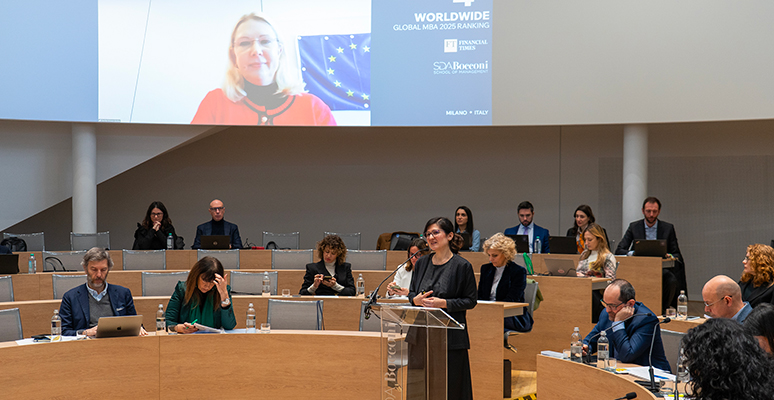
"Given the strong interest in Digital Product Passports, consumers now seem ready to start testing them, recognizing their benefits, such as greater transparency on how to extend product life cycles through second-hand or repair services," said Francesca Romana Rinaldi, Director of the Monitor for Circular Fashion SDA Bocconi. "The M4CF is a pre-competitive space where ingredient brands, vendors, brands, retailers, and service providers in the fashion industry can collaborate in sharing best practices and recommendations for policymakers, with the goal of harmonizing and accelerating the twin transition."
In the next steps of M4CF, which will launch its fifth edition on March 13 with the inclusion of new partners, an important discussion with policymakers in Brussels in June 2025 will take place to present the first results from the working groups on ecodesign, social impact, and the role of technologies.
The 2024/2025 Report is available at: www.sdabocconi.it/circularfashion.


Comprendere a fondo e implementare con efficacia la nuova dimensione della sostenibilità aziendale e saper realizzare un piano strategico guidato da criteri ESG.

Il corso intende fornire tutte le competenze necessarie a padroneggiare e applicare i principali strumenti e framework esistenti in materia di sustainability reporting.

